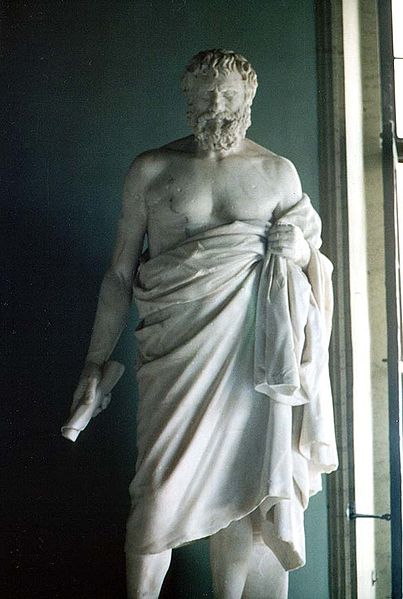Cynicism is a school of thought in ancient Greek philosophy, originating in the Classical period and extending into the Hellenistic and Roman Imperial periods. According to Cynicism, people are reasoning animals, and the purpose of life and the way to gain happiness is to achieve virtue, in agreement with nature, following one's natural sense of reason by living simply and shamelessly free from social constraints. The Cynics rejected all conventional desires for wealth, power, glory, social recognition, conformity, and worldly possessions and even flouted such conventions openly and derisively in public.
Statue of an unknown Cynic philosopher from the Capitoline Museums in Rome. This statue is a Roman-era copy of an earlier Greek statue from the third century BC. The scroll in his right hand is an 18th-century restoration.
The Cynics adopted Heracles, shown here in this gilded bronze statue from the second century CE, as their patron hero.
Bust of Antisthenes
Diogenes Searching for an Honest Man (c. 1780) attributed to J. H. W. Tischbein
Ancient Greek philosophy arose in the 6th century BC. Philosophy was used to make sense of the world using reason. It dealt with a wide variety of subjects, including astronomy, epistemology, mathematics, political philosophy, ethics, metaphysics, ontology, logic, biology, rhetoric and aesthetics. Greek philosophy continued throughout the Hellenistic period and later evolved into Roman philosophy.
Four Greek philosophers: Socrates, Antisthenes, Chrysippos, Epicurus; British Museum
The philosopher Pyrrho of Elis, in an anecdote taken from Sextus Empiricus' Outlines of Pyrrhonism (upper) PIRRHO • HELIENSIS • PLISTARCHI • FILIVS translation (from Latin): Pyrrho • Greek • Son of Plistarchus (middle) OPORTERE • SAPIENTEM HANC ILLIVS IMITARI SECVRITATEM translation (from Latin): It is right wisdom then that all imitate this security (Pyrrho pointing at a peaceful pig munching his food) (lower) Whoever wants to apply the real wisdom, shall not mind






